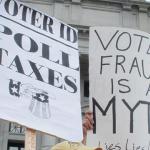The Myth of Voter Fraud

When there has been election fraud in American elections, it has usually been committed by politicians, party operatives and election officials who have something at stake in electoral outcomes. Voters rarely commit fraud because for them, it is a motiveless crime, the individual benefits to the fraudulent voter are immaterial, while the costs are prohibitive.

Lorraine C. Minnite
Rutgers University
The most important illustration of outright corruption of elections is the century-long success of white supremacists in the American South stripping African-Americans of their right to vote. Elites and party bosses in the urban North followed the Southern example, using some of the same tricks to manipulate electoral outcomes and to disfranchise immigrants and the poor.
From this perspective, the impact of election fraud on American elections has been massive. It was only with the rise of the Black Freedom Movement and passage of the Voting Rights Act in 1965, that the tricks and political chicanery were halted. In fact, according to the political historian J. Morgan Kousser, the Voting Rights Act is the most important fraud-prevention legislation ever passed.
In response to these victories, a reactionary movement arose to push back against progress in civil rights and to counter the thrust toward a more equal society. Over the last 40 years, that movement has made important gains, especially in the courts, where a conservative Supreme Court, in a 2013 case called Shelby County v. Holder, gutted one of the most effective features of the Voting Rights Act – the “preclearance” formula which forced states and localities with the most egregious histories of vote denial to obtain permission from the Justice Department before putting new election rules in place.
In what is likely no coincidence, the rate at which states have adopted tougher photo identification requirements accelerated with the election of the nation’s first black president and the demise of legally-mandated federal oversight in the Shelby case
Prior to the contested 2000 presidential election, only 14 states either requested or required that voters show some form of identification at the polls. Since then, the number of states requiring ID to vote has doubled and the forms of acceptable identification have narrowed. In what is likely no coincidence, the rate at which states have adopted tougher photo identification requirements accelerated with the election of the nation’s first black president and the demise of legally-mandated federal oversight in the Shelby case.
In rapid succession, partisan lawmakers in state after state have pushed through the new rules, claiming tougher identity checks are necessary to staunch or prevent voter fraud. And yet, in no state adopting a photo ID requirement has any lawmaker or anyone else, for that matter, presented a credible showing of a problem with voters corrupting the electoral process. In other words, if the claimed reason of preventing voter fraud is taken at face value, there is no rational basis for the policy intervention. So what is actually going on?
I think the phony claims and renewed political chicanery are a reflection of the fact that a century-and-a-half after the Civil War, and 50 years after the signing of the Voting Rights Act, a deeper struggle for democracy, equality and inclusion continues. Beneath the skirmish over arcane voting rules is a fraught tension between our ideals and our fears, between what we profess to believe about the “sanctity” of the ballot, and racialized and class-based notions of worthiness embedded in the question of who is to be a citizen in the United States.
The myth of voter fraud persists because it is a racialized weapon in a power struggle over the soul of American democracy
The myth of voter fraud persists because it is a racialized weapon in a power struggle over the soul of American democracy. To see this, we must set our current politics in a historical context. Long-standing fears about unworthy citizens polluting and distorting electoral outcomes are the underside of the usual celebratory story we like to tell ourselves of a progressive struggle for voting rights. In fact, the struggle has not unfolded in a linear fashion. Each successive advance has generated counter-movements rooted in alternative and reactionary histories aimed at “taking back” at least a part of what has been lost. In our own time, from the moment blacks began exercising their newly (re-)won right to vote, that right was undermined in ways that constrained its power to deliver social justice. The question of who is to be a citizen in our racially divided and injured society remains unresolved.
The views expressed in this post are the author’s alone, and presented here to offer a variety of perspectives to our readers.
Lorraine C. Minnite is the director of the urban studies program at Rutgers University–Camden. She is the author and co-author of two books on electoral rules and racial and class politics in the US.
